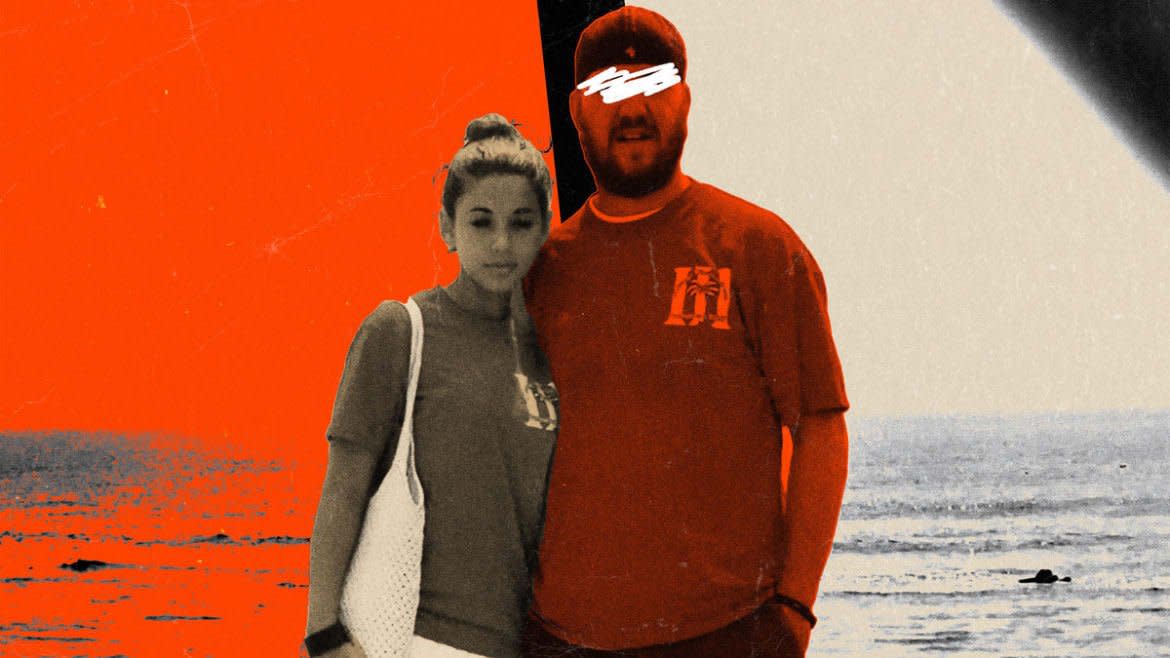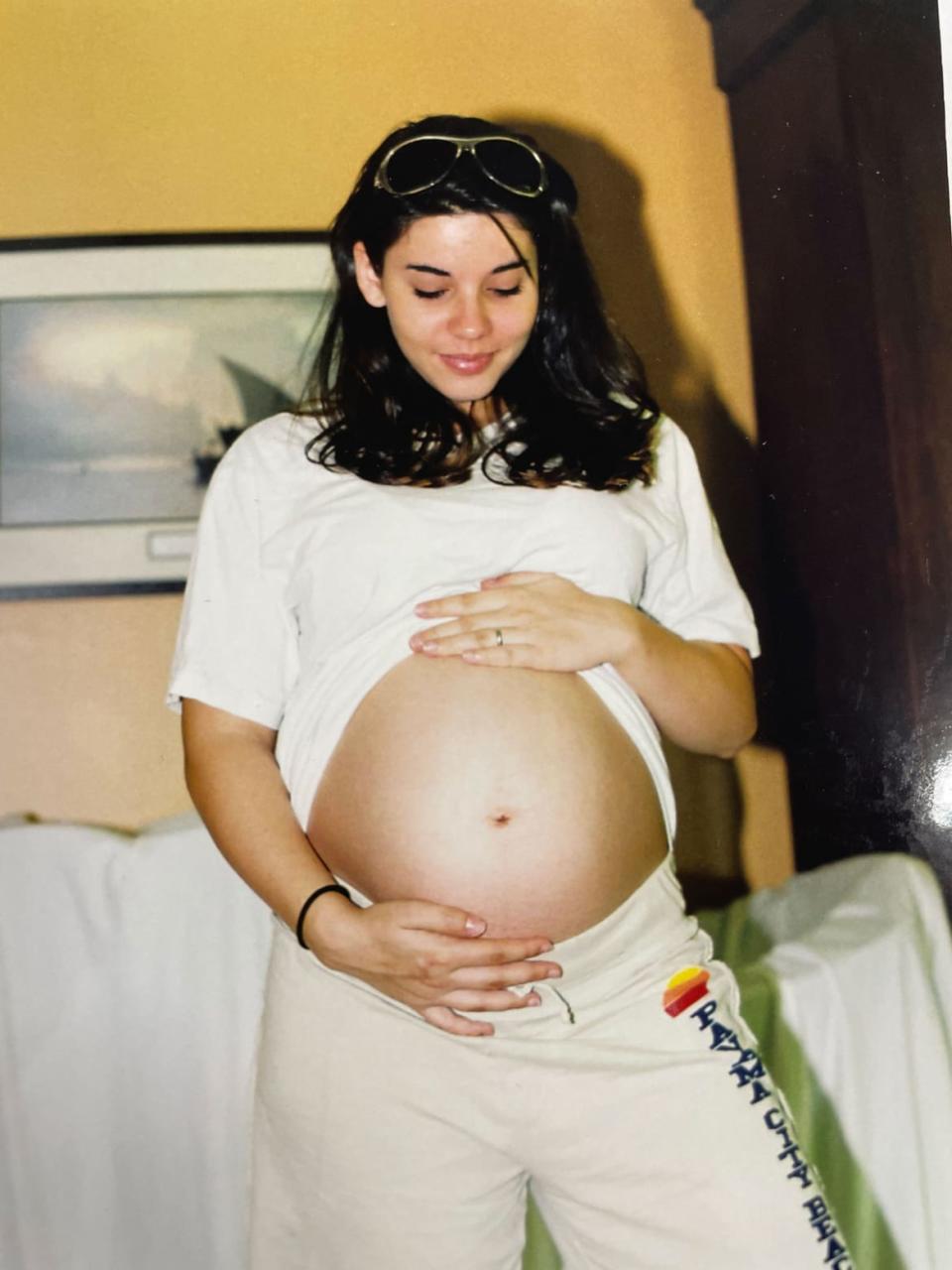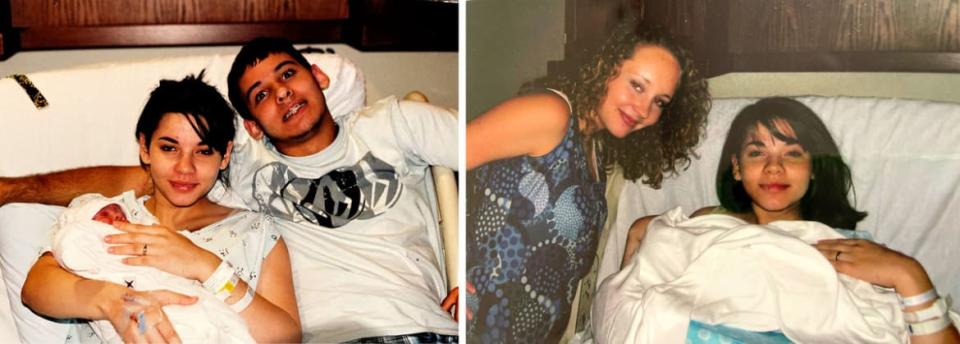She Was a Child Bride. Why Does Her Ex Still Share Custody of Their Child?

Last year, Ash Pereira called the police in her hometown of Enterprise, Alabama, to report a rape.
The date of the alleged crime was nearly 15 years earlier; the accused, her now ex-husband, Jason Greathouse. Pereira, now 30, was locked in a bitter custody dispute with the man, a former youth pastor who impregnated her when she was 15 and he was 25.
What ensued was shocking to Pereira and many observers: Her ex was allowed to plead to a misdemeanor, did not have to register as a sex offender, and maintains partial custody of their 14-year-old daughter.
Inside the Rape Case Tearing a Rhode Island Town Apart
Pereira, meanwhile, had to defend herself against accusations that she was an unfit mother and that she was using the statutory rape accusation as a cudgel to get Greathouse to give up his child.
The battle has now pitted mother against daughter, with Pereira claiming her mother was the driving force behind her childhood marriage and her mother claiming Pereira is simply out for blood.
“I really feel for my daughter, I really do,” Pereira’s mother, Jennie Jett, told The Daily Beast. “[But] people don’t understand everything that happened.”
“You’ve given your body to someone and you need to take responsibility for your own actions”
Growing up, Pereira was used to feeling like an outsider. A self-described “military brat,” she bounced between four states before her 13th birthday: Louisiana, Tennessee, Alabama, New York, then back to Alabama, near the naval base in Enterprise. One of the only constants in her life was religion: No matter where she went, her parents always joined a church. Pereira and her brother spent three days a week in the pews, learning scripture and—as Pereira puts it—having “the fear of hell absolutely burned into our heads.”
At age 13, shortly after moving to Enterprise, Pereira developed a severe eating disorder—a result, she says, of once again struggling to fit in with new classmates. Instead of getting her treatment, Pereira says, her mother pulled her out of school and attempted to cure the disorder herself. “My mom thought Jesus could fix everything,” she said. (Her mother claims Pereira was “not cooperative” when she tried to bring her to counseling sessions.)
It was around that time that Pereira’s mother enrolled her in a youth group with Greathouse, a charming 24-year-old pastor from her favorite Christian supply store. Pereira had her issues with religion—she once got in trouble for asking a teacher who said suicide was a sin whether she would go to hell for smoking—but she says Greathouse was different from other church leaders. He was more progressive than her parents, and seemed to actually listen to her. He treated her, she said, “like an adult.”
Greathouse did not respond to multiple calls and emails seeking comment for this story, nor did his civil and criminal attorneys.
A few months after they met, Greathouse moved in with Pereira’s family. He wanted to go to college but couldn’t afford rent, she says, so her parents offered him their spare bedroom. Pereira was still being homeschooled, and with Greathouse in the house, she says, the two were together “constantly.” Slowly, a flirtation developed. She says she was 14 the first time they had sex, after listening to a sermon in her parents’ living room.

If Pereira’s parents noticed what was going on, she says, they didn’t say anything. (Her brother says he tried to raise the issue with their mother once, but she threatened to ground him if he brought it up again.) When Pereira finally told her mother what had happened, she says, “she turned around and kind of made it my responsibility.”
“She was like, ‘Well, you’re supposed to save this for marriage, and [now] you’ve given your body to someone and you need to take responsibility for your own actions,’” she recalled.
Her mother recalls the situation differently. She claims Pereira lied about her age to Greathouse and only sought out her mother to confess her deception after the fact. She says she never blamed her daughter and held Greathouse “accountable,” though she did not specify how.
“I remember when I told him [her age], he just about fell apart and was shaking,” she said. “I believe 100 percent that he did not know.”

But there’s no denying that by 15, Pereira was pregnant with Greathouse’s baby. (Greathouse has admitted as much in court filings.) She says she was panicked, and her father was furious, but her mother seemed unconcerned. “She seemed more excited about being a grandmother than she was upset about what had happened to her daughter,” her brother recalled.
Eventually, she says, the family decided the best course of action was for the two to be wed. “I felt like I owed it to him and my mom and God to make things work,” Pereira recalled. “I was coerced into understanding that I was supposed to be with this person for the rest of my life because we had sex.” (Her mother claims the wedding was Pereira’s idea.)
On May 4, 2007, five days after her 16th birthday, Pereira marched to the courthouse and married her 25-year-old pastor.
“He knew how old I was for so long”
A few months into her marriage with Greathouse, Pereira started to have doubts. She had just started work as a hostess at her local Ruby Tuesday’s, and her coworkers were openly horrified by her situation. She told a friend, Katelynd Anderson, that she hated sleeping in the same bed with her husband. On top of that, Pereira claims, Greathouse had started acting strangely, staying out at night on “runs” with a female coworker and evading her questions. (Greathouse alleges in court documents that it was Pereira who cheated on him.)

So one day, Pereira picked up her paycheck and didn’t go home. She spent a couple weeks couch-surfing until Anderson’s family offered to take her in for good. She got a new job—ironically, she says Ruby Tuesday’s fired her for being underage—and used her next paycheck to hire a lawyer. The divorce process was expensive, and she was an underemployed teenager, so when Greathouse put up a fight, she says, she didn’t have the resources to fight back. She settled for 50/50 custody and no child support.
At the time, Pereira says, she thought she couldn’t press charges against Greathouse because they had been married. Instead, she tried to move on with her life. She finished her GED and enrolled in college; moved with a partner to Tennessee; broke up with him; pursued a career in acting; started her own pedicab business. Often she found herself between jobs and struggling to make ends meet; occasionally she suffered physical symptoms of PTSD so severe she wound up in the emergency room. She says she tried to think of Greathouse as little as possible, going so far as to change his name on her phone so she could pretend it was someone else when he called.
Then, early last year, Greathouse tried to introduce a court order in Tennessee that would give him primary custody of their child. (The two disagree on whether Pereira had knowingly signed off on this before.) The dispute was intense: In court documents, Greathouse accused Pereira of being an absent parent, of prioritizing her career over her child, and of introducing their daughter to the occult. He also included an 8-year-old affidavit from Pereira’s second husband, claiming that she cheated on him and falsely accused him of abusing her. (In an email to Pereira last year, the second husband wrote that anything he said at the time was “the bias of a jaded ex-husband” and “should not even be admissible at this point.”)
Most infuriating to Pereira, Greathouse repeated to the court her mother’s claim that she lied about her age—something she and her father say would have been impossible. “I was in his junior high youth group. He taught me how to drive,” she scoffed. “He knew how old I was for so long.”
It was traumatizing, Pereira says, to watch Greathouse take the stand and deny that he had been in the wrong. More than anything, though, it confused her that a judge would consider granting him custody in the first place.
“I tried to tell them what happened to me, and they just would not recognize it,” she said. “They would not take it seriously because he had never been fully convicted.”
A ‘sickening’ national situation
Pereira’s account may be shocking, but it isn’t unique. In the overwhelming majority of U.S. states, child marriage is still perfectly legal, as long as a parent or judge consents. According to one study, nearly 300,000 minors were married in the U.S. between 2000 and 2018—most of them underage girls married to men at least four years older.
Once they’re in these marriages, says Freidy Reiss, founder of anti-child-marriage charity Unchained At Last, the girls are stuck in a “nightmarish legal trap.” What would have been considered a crime—sex between a minor girl and an adult man—is now perfectly legal. And their options for leaving are drastically limited.
In most states, Reiss explained, minors who leave home are considered runaways, meaning police can return them to their homes and even arrest them if they don’t comply. Most domestic violence shelters won’t accept victims under the age of 18 for similar reasons. Young people also have a hard time securing lawyers, because contracts with minors are usually considered voidable, and they cannot bring a legal proceeding like a divorce or restraining order in their own name.
Because of this, Reiss said, she’s seen numerous child brides turn to suicide.
“We honestly have set up a system where I can understand why someone would think, ‘The only way out for me is death,’” she said.
Laws protecting women of all ages who are impregnated by their rapists are not much better. More than a third of states still require a felony conviction in order to terminate the rapist’s right to custody of the child—more than what’s required in cases of child abuse, neglect, molestation, or a myriad of other reasons a judge might terminate parental rights. And that’s a problem because, while an estimated 17,000 to 32,000 rape-related pregnancies occur each year, less than 1 percent of rapes result in a felony conviction.
As a result, stories abound of women who are forced to share custody with their alleged attackers: The Nebraska woman whose assailant won visitation rights despite pleading guilty to third-degree sexual assault; the Pennsylvania woman whose rapist maintained a right to shared custody even from jail; the woman in Detroit who was forced to split custody with the man who abducted and raped her at age 13. (The judge in the latter case eventually reversed his ruling.)
Perhaps most similar to Pereira is the case of Jessica Stallings, another Alabama native who says her mother’s half-brother started having sex with her when she was 13 and he was 20. Stallings says her parents did nothing to stop the abuse and instead forced her to marry her assailant, who eventually impregnated her multiple times. When Stallings finally mustered the courage to leave, the court granted him visitation rights.
Stallings was still fighting for full custody in 2019, when Alabama passed a law requiring courts to terminate the parental rights of convicted rapists. But the law required Stallings to get a felony conviction against her uncle, which she was not able to do—despite twice going to a grand jury with birth certificates, medical records and DNA evidence.
“It’s sickening,” Stallings told The Washington Post. “I’ve spent my entire life scared to death of my rapist, and now, I’m fighting him for custody of my children.”
“I don’t want to have to ask my rapist’s permission for things”
Greathouse and his attorneys have repeatedly argued that Pereira only reported him to get the upper hand in their custody dispute; to “use the circumstances of the child’s conception as a way to force a change in custody,” as one court filing put it. But Pereira is adamant that her reasoning was more complicated. To start with, she says, she didn’t even know she could press charges until after the latest custody battle started. And even then, she says, the point of reporting him wasn’t to win a legal fight, but to earn her freedom.

“People don’t understand that [even though] the situation was so many years ago, I still have to cope with it to this day, and I still have to co-parent with someone who took my virginity as a grown man,” she said.
“I don’t want to have to ask my rapist’s permission for things,” she added. “No one should ever have to do that.”
Greathouse was arrested on Aug. 12, 2020, on a charge of second-degree rape, and released on bond that same day, according to court records. But Pereira says she didn’t hear anything from the district attorney’s office for weeks, and didn’t speak to an attorney on the case until the day of Greathouse’s sentencing. She was on her way from Nashville to Enterprise for the first day of trial when a victims’ services officer called to tell her it was off, and that Greathouse was taking a plea deal. He copped to contributing to the delinquency of a minor—a misdemeanor—and got a two-year suspended sentence, meaning he will likely never spend a day in jail.
Coffee County District Attorney Tom Anderson, whose office handled the case, said in an email that he had taken more than 80 cases to verdict and would have been “shocked” if a jury returned anything other than a not guilty ruling in this one. He said the defense could argue that Pereira only filed the complaint in order to win the custody battle, potentially swaying the jury against her. And in an interview with AL.com, defense attorney David Harrison did just that, claiming he had text messages in which Pereira threatened to have Greathouse charged if he didn’t give her full custody.
“This person used the court system here to try to, in my opinion, coerce mentally, emotionally, somebody to give up custody of his child,” Harrison said.
Pereira denies sending Greathouse any direct threats and says she could have explained her texts to the DA’s office if they’d ever asked her. But she also doesn’t understand why any of this matters. She is 30, Greathouse is 40, and their daughter turned 14 in August. If the jury could do basic arithmetic, that should be all the evidence they’d need.
“It doesn’t matter if I became the worst person imaginable after the fact,” she said. “He still did the crime. He still was a 25-year-old man who got a 15-year-old pregnant. And there’s nothing stopping him from doing whatever he wants in the future.”
Jenny Carrol, a professor at the University of Alabama Law School and former public defender, says she wasn’t surprised by the prosecutor’s decision to offer a plea deal. A jury might discount someone who didn’t appear to be the “perfect victim,” she said, and an under-resourced prosecutor’s office might see a decade-old case as low priority. But just because the case is typical, she added, doesn’t make it right. “If anything, it just highlights how broken the system is when it comes to sexual assault,” she said.
The family court judge has yet to make a decision in Greathouse and Pereira’s custody dispute, but Tennessee is one of the states that requires a felony conviction to terminate parental rights. For the time being, the two continue to share custody of their daughter.
Pereira insisted on attending Greathouse’s sentencing hearing, and wrote her victim’s statement from her father’s wrap-around porch the night before. In the courtroom that day, she told the story of a childhood cut short, of adults who failed to protect her, and of a life spent dealing with the impact. And she told the judge how terrified she is that Greathouse would do something like this again.
“Fifteen years ago, I was forced to grow up prematurely,” she wrote. “I’ve spent the past 15 years trying to co-parent with my rapist to provide a better life for our child. Fifteen years was too much. And now, due to the court’s desire to settle cases quickly rather than seek justice for those wronged, I’m forced to continue seeing my rapist weekly. I’m forced to relive my trauma every week.”
Worst of all, she added, she had never received an apology.
“[Greathouse] doesn’t think he is wrong or guilty of his actions,” she wrote, “and to me that is the most dangerous kind of criminal.”
Get our top stories in your inbox every day. Sign up now!
Daily Beast Membership: Beast Inside goes deeper on the stories that matter to you. Learn more.

